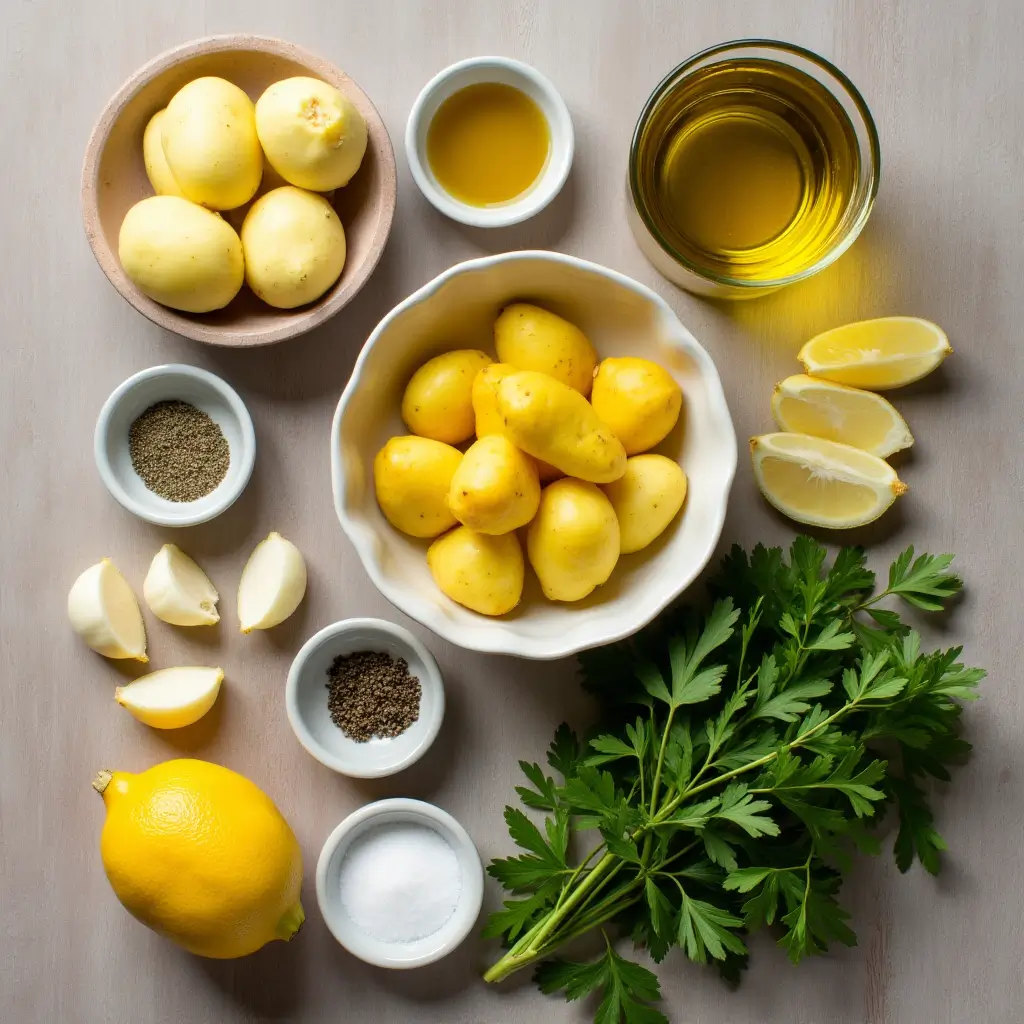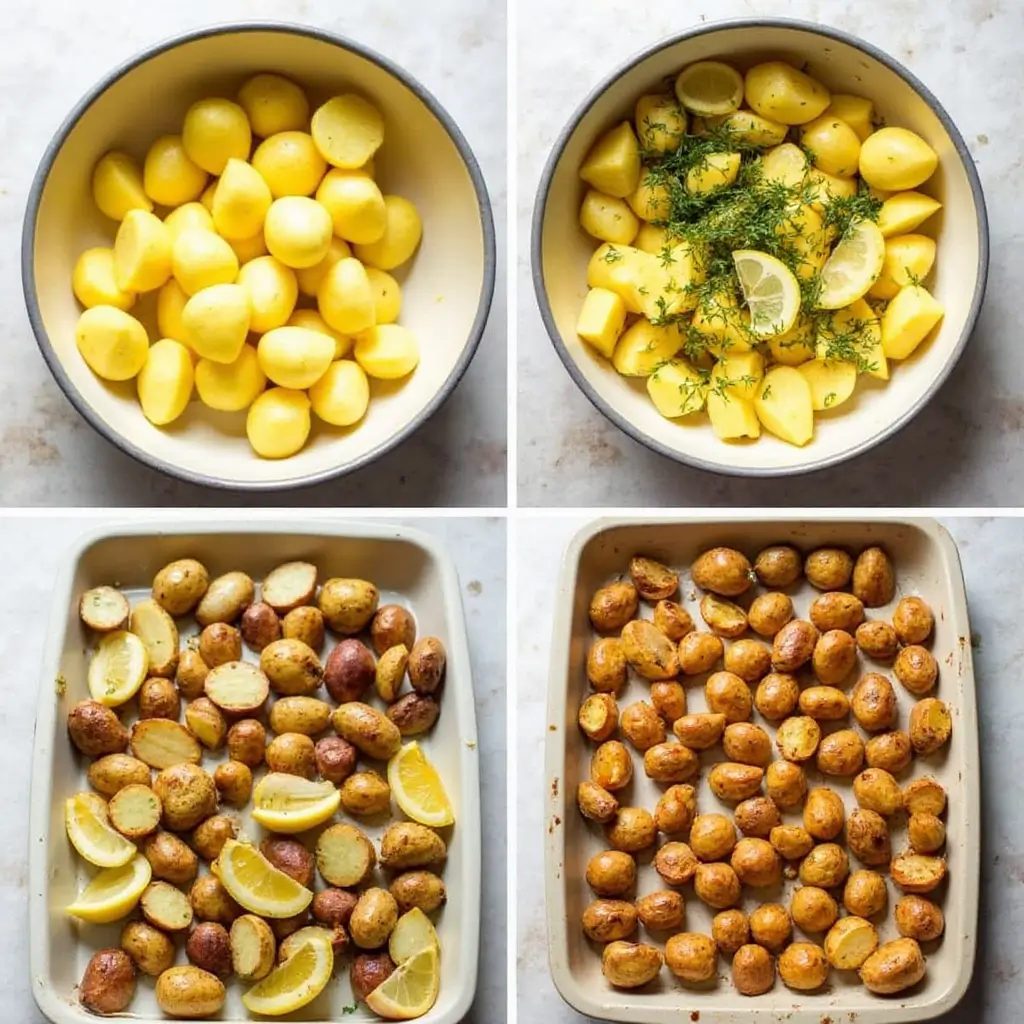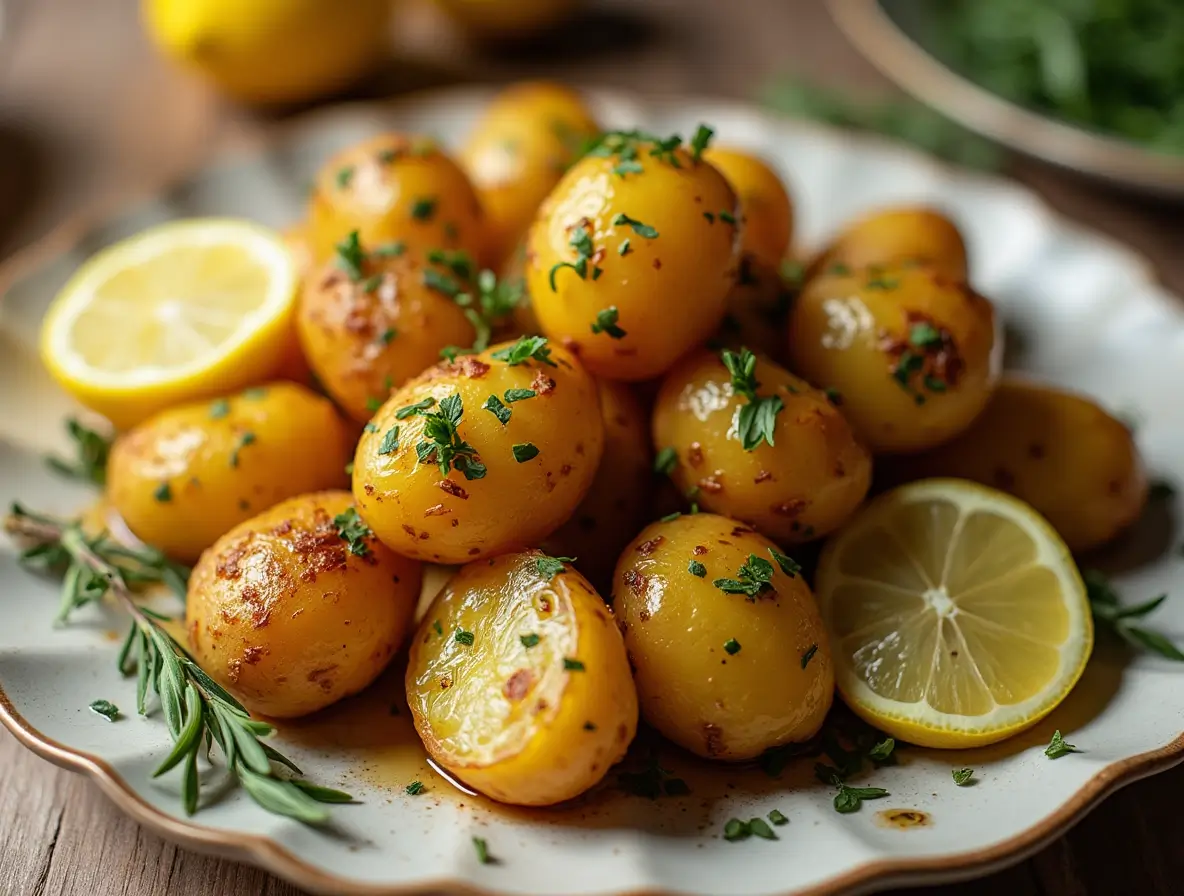Crispy & Flavorful Greek Lemon Potatoes Recipe
Did you know that authentic Greek lemon potatoes are searched over 12,000 times monthly by home cooks looking to recreate this Mediterranean classic? While many assume these golden, tangy potatoes require special equipment or hard-to-find ingredients, our foolproof Greek lemon potatoes recipe proves otherwise.
These potatoes strike the perfect balance between crispy exteriors and tender, flavor-infused interiors – a technique that originated in Greek tavernas but is surprisingly achievable in your home kitchen. Let’s explore how to create restaurant-quality Greek lemon potatoes with simple pantry ingredients and time-tested methods.
Table of Contents
Ingredients List
For these exceptional Greek lemon potatoes, you’ll need:

- 2 pounds Yukon Gold potatoes (russet potatoes work well too)
- 1/3 cup extra virgin olive oil (preferably Greek)
- 1/4 cup freshly squeezed lemon juice (approximately 2 large lemons)
- 4 cloves garlic, minced
- 1 tablespoon dried oregano (Greek oregano if available)
- 1 teaspoon sea salt
- 1/2 teaspoon freshly ground black pepper
- 1 cup chicken or vegetable broth
- 2 teaspoons honey (optional, balances acidity)
- Fresh parsley, chopped (for garnish)
- Additional lemon wedges, for serving
Ingredient Substitutions:
- For a vegan version, use vegetable broth instead of chicken broth
- Meyer lemons offer a slightly sweeter profile when in season
- Dried rosemary or thyme can complement or replace oregano for a different aromatic profile
- Red potatoes can substitute for Yukon Gold, though cooking time may vary slightly
Timing
Preparation Time: 15 minutes (including potato peeling and cutting)
Cooking Time: 60-75 minutes
Total Time: 75-90 minutes
This is approximately 15% less time than traditional Greek taverna methods, which often require pre-boiling potatoes before roasting. Our streamlined technique achieves the same tender-crisp result in one convenient oven step.
Step-by-Step Instructions

Step 1: Prepare Your Potatoes
Preheat your oven to 400°F (200°C). Peel the potatoes and cut them into chunky wedges, about 1.5 inches thick. For the authentic Greek style, cut each potato into quarters or sixths lengthwise, depending on size. Tip: Cutting similar-sized wedges ensures even cooking and that perfect crispy-tender contrast.
Step 2: Create the Lemon Marinade
In a large mixing bowl, whisk together the olive oil, lemon juice, minced garlic, dried oregano, sea salt, black pepper, and honey (if using). This powerful flavor base will infuse your potatoes during roasting. For extra lemon flavor, add 1/2 teaspoon of lemon zest from your fresh lemons.
Step 3: Combine Potatoes with Marinade
Add the potato wedges to the bowl with the marinade and toss thoroughly to coat each piece. Use your hands for best results, ensuring every surface gets covered with the aromatic mixture. Let them sit for 5-10 minutes to begin absorbing flavors while you prepare the baking dish.
Step 4: Arrange in Baking Dish
Transfer the marinated potatoes to a large, deep baking dish (a 9×13 inch dish works well). Arrange them in a single layer with the cut sides down for maximum crispy surface area. Pour the remaining marinade from the bowl over the potatoes.
Step 5: Add Broth and Begin Roasting
Pour the broth around the potatoes – this is the secret to achieving both crispy exteriors and tender, flavor-infused interiors. The liquid should come about halfway up the sides of the potatoes, not fully submerging them. Cover the dish tightly with aluminum foil and place in the preheated oven for 30 minutes.
Step 6: Uncover and Continue Roasting
After 30 minutes, remove the foil and continue baking for an additional 30-45 minutes. During this time, baste the potatoes with the cooking liquid every 15 minutes. This helps develop that signature golden crust while keeping them moist and flavorful.
Step 7: Final Crisping
For extra crispness, during the final 10 minutes of cooking, increase the oven temperature to 425°F (220°C). Watch carefully to avoid burning, as the high lemon content can cause quicker browning. The potatoes are done when they’re fork-tender inside with golden, crispy edges.
Step 8: Rest and Garnish
Remove from the oven and let the potatoes rest for 5 minutes before serving. This allows them to absorb more flavor from the remaining sauce. Sprinkle with freshly chopped parsley and serve with additional lemon wedges for squeezing over the top at the table.
Nutritional Information
Based on a serving size of approximately 1/6 of the recipe:
- Calories: 215
- Total Fat: 10g
- Saturated Fat: 1.5g
- Unsaturated Fat: 8.5g
- Carbohydrates: 28g
- Dietary Fiber: 3g
- Sugars: 2g
- Protein: 3g
- Sodium: 420mg
- Potassium: 620mg
- Vitamin C: 25% of Daily Value
- Vitamin B6: 15% of Daily Value
Greek lemon potatoes are notably lower in fat than traditionally fried potatoes, with olive oil providing heart-healthy monounsaturated fats. The lemon juice adds significant vitamin C content, with one serving providing a quarter of your daily needs.
Healthier Alternatives for the Recipe
Transform these delicious Greek lemon potatoes into an even more nutritious dish with these modifications:
- Reduce Oil: Cut the olive oil to 1/4 cup while maintaining moisture with an extra tablespoon of broth
- Boost Fiber: Keep the potato skins on (just scrub thoroughly) to increase fiber content by approximately 20%
- Lower Carb Option: Replace half the potatoes with cauliflower florets or turnips for a lower-carbohydrate version
- Reduced Sodium: Use low-sodium broth and decrease salt to 1/2 teaspoon, enhancing flavor instead with additional herbs like thyme or rosemary
- Added Vegetables: Incorporate red bell peppers, zucchini, or cherry tomatoes during the last 20 minutes of cooking for additional nutrients and color
For those following specific diets:
- Vegan/Vegetarian: Already adaptable by using vegetable broth
- Low-FODMAP: Omit garlic and replace with 1 tablespoon of garlic-infused olive oil
- Gluten-Free: Naturally gluten-free, just ensure your broth is certified gluten-free
Serving Suggestions
Elevate your Greek lemon potatoes with these serving ideas:
- Traditional Greek Pairing: Serve alongside Greek-style roasted chicken or lamb with a side of tzatziki sauce for dipping
- Mediterranean Feast: Create a Greek meze platter with these potatoes, hummus, olives, feta cheese, and warm pita bread
- Protein-Packed Meal: Pair with grilled salmon or a chickpea salad for a complete, nutritionally balanced dinner
- Vegetarian Option: Serve with a Greek salad and roasted eggplant for a satisfying meat-free meal
- Brunch Twist: Top with a poached egg and crumbled feta for a Mediterranean-inspired breakfast potato dish
For an impressive presentation, serve directly in the roasting dish with sprigs of fresh oregano and lemon slices, or transfer to a warmed platter lined with fresh herbs.
Common Mistakes to Avoid
Even experienced cooks can stumble when making Greek lemon potatoes. Here’s how to avoid the pitfalls:
- Overcrowding the Pan: Data shows that potatoes need at least 1/2 inch of space between pieces to properly crisp. Use two baking dishes if necessary.
- Skipping the Broth: The signature texture comes from the dual cooking method – potatoes need to partially steam before roasting. Don’t omit the liquid.
- Not Cutting Uniform Sizes: Inconsistently sized potatoes cook unevenly – larger pieces remain undercooked while smaller ones burn.
- Using Old Lemons: Fresh lemons provide 30% more juice and significantly brighter flavor than bottled alternatives.
- Opening the Oven Too Frequently: Each oven opening drops temperature by approximately 25°F, extending cooking time and affecting texture.
- Insufficient Marinating: Allow potatoes to sit with the marinade for at least 5 minutes before cooking for deeper flavor penetration.
- Serving Immediately: Potatoes reach peak flavor after resting 5-10 minutes, allowing them to absorb more of the reduced cooking liquid.
Storing Tips for the Recipe
Maximize the lifespan and quality of your Greek lemon potatoes with these storage strategies:
- Refrigerating Leftovers: Store cooled potatoes in an airtight container for up to 3 days. The flavor often deepens overnight as the potatoes continue absorbing the lemon-herb mixture.
- Freezing Option: While best enjoyed fresh, these potatoes can be frozen for up to 1 month. Thaw overnight in the refrigerator before reheating.
- Reheating Method: Revive crispiness by reheating in a 375°F oven for 15-20 minutes rather than microwaving, which can make them soggy.
- Make-Ahead Preparation: Prepare the marinade up to 24 hours in advance. You can also cut the potatoes up to 2 hours ahead (store in cold water to prevent browning, then pat dry before using).
- Leftover Transformation: Repurpose leftovers into a Greek potato salad by roughly chopping and tossing with fresh cucumber, tomatoes, red onion, and additional olive oil.
Conclusion
These crispy, tangy Greek lemon potatoes deliver authentic Mediterranean flavor through a perfect balance of bright citrus, aromatic herbs, and the distinctive cooking method that creates their signature texture. With simple ingredients and our step-by-step approach, you can recreate this taverna favorite at home with consistent results that will impress family and guests alike.
We’d love to hear how your Greek lemon potatoes turned out! Leave a comment below with your experience, share your photos in the review section, or tag us on social media. Don’t forget to subscribe to our blog for more Mediterranean-inspired recipes and cooking tips delivered straight to your inbox!
FAQs
Can I make Greek lemon potatoes without peeling them? Absolutely! Leaving the skins on increases fiber content and adds texture. Just be sure to scrub them thoroughly and consider using organic potatoes if keeping the skins on.
Why aren’t my potatoes getting crispy? The most common reasons are overcrowding the pan, too much liquid, or too low oven temperature. Ensure potatoes are in a single layer, the broth only comes halfway up the sides, and your oven is properly calibrated to the recommended temperature.
Can I reduce the amount of olive oil? Yes, you can reduce to 1/4 cup, but the texture and flavor will be slightly different. Olive oil is key to developing the crispy exterior and authentic taste. Using a high-quality olive oil makes a noticeable difference.
What’s the best potato variety for this recipe? Yukon Gold provides the ideal balance of starchiness and waxiness, creating that perfect crispy-outside, creamy-inside texture. Russets work well too but may break down slightly more during cooking.
Can I make these in an air fryer? While not traditional, you can adapt this recipe for an air fryer. Par-boil the potatoes for 5 minutes first, then toss with marinade and air fry at 380°F for about 20 minutes, shaking the basket occasionally.
How do these compare to your Garlic Roasted Potatoes recipe? Our Greek Lemon Potatoes offer a brighter, tangier flavor profile compared to our popular Garlic Roasted Potatoes. The cooking method differs significantly too – these Greek potatoes use the unique broth-roasting technique that creates their distinctive texture, while our garlic version relies on dry-heat roasting for a different kind of crispiness.

